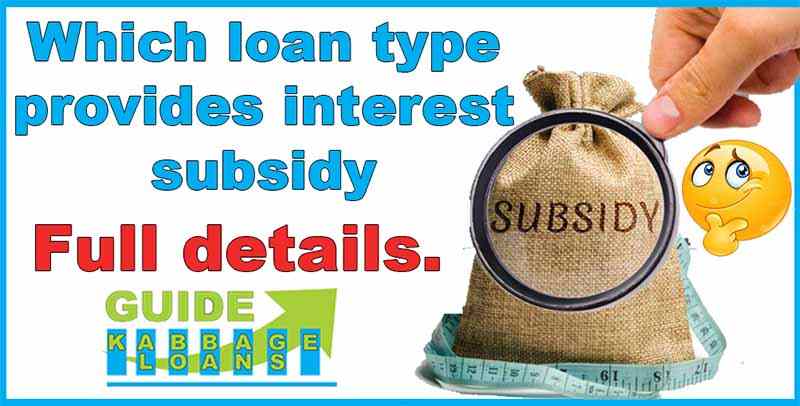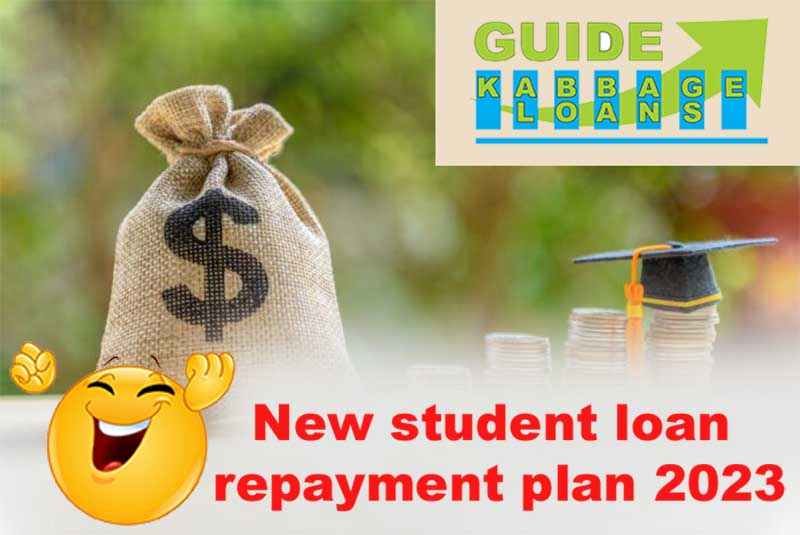Interest subsidies can make a big difference for borrowers looking for financial help. These subsidies lower the interest rates on certain loans, making them more affordable. Many people may not know that some loans offer these benefits. In this article, we will discuss which loan type provides interest subsidy, how to qualify, and how to apply for these offers. This information can help you find the right loan for your needs.
What is an interest subsidy?
In the USA, the rebate in loan interest received from the government is called an interest subsidy. You should know that some people, whether it is individuals or businessmen, take loans. However, due to his poor financial condition, he is not able to repay the loan completely.
They expect from the government that they should get an exemption in the interest of the loan they have taken. Keeping all these things in mind, the Government of the USA has come out with a scheme of interest subsidy, which has been going on for a long time. But interest subsidy is available only to those who generate a specific income and at the same time have a specific credit score, only then they are entitled to interest subsidy.
Which loan type provides interest subsidy?
In the USA, many loans are available, but only a few come with interest subsidies. These subsidies help make loans more affordable for those who qualify. Before you can receive an interest subsidy, the lender will check your income and credit score to see if you’re eligible.
Here are some loans that offer interest subsidies.
FHA Loans
Target Applicants: First-time homebuyers who may not have a large down payment.
Official Website: FHFA
Interest Rate: Typically between 3.5% and 4.5%, with some subsidies available.
The government helps lower some of the interest costs for these loans, making it easier for people to buy their first home. However, you must meet specific income and credit score requirements to qualify for the subsidy.
VA Loans
Target Applicants: Active-duty military members, veterans, and some surviving spouses.
Official Website: va.gov
Interest Rate: Generally lower than conventional loans, often around 3% to 4%, with potential subsidies.
VA loans are backed by the government, which means the interest rates are low. The VA helps service members afford their homes by subsidizing some of the interest costs.
SBA-7(a) and 504 Loans
Target Applicants: Small business owners and entrepreneurs looking to start or grow a business.
Official Website: SBA
Interest Rate: Usually between 5% and 10%, with a portion subsidized based on eligibility.
SBA loans support small businesses by offering lower interest rates. The government helps pay part of the interest, making it easier for entrepreneurs to succeed.
USDA Loans
Target Applicants: Low to moderate-income individuals or families in rural areas.
Official Website: USDA
Interest Rate: Typically around 3% to 6%, with significant subsidies available.
The USDA provides loans to help people in rural areas purchase homes. Depending on your income and credit score, you might receive a full interest subsidy, making homeownership more accessible.
Department of Education Student Loans
Target Applicants: Students who need financial help to continue their education.
Official Website: StudentAid.gov
Interest Rate: Generally between 3% and 6%, with subsidies for eligible students.
These loans assist students who excel academically but face financial challenges. The government offers interest subsidies to help them afford their education, ensuring they can pursue their dreams.
Direct Subsidized Loans
Target Applicants: Undergraduate students with financial need.
Official Website: StudentAid.gov
Interest Rate: Fixed at 5.50% but interest is subsidized while you’re in school.
Direct Subsidized Loans are a type of federal student loan available to undergraduates who demonstrate financial need. The government pays the interest while you’re in school, during the grace period, and during deferment periods. This subsidy can save students a significant amount of money over the life of the loan.
Eligibility Criteria for Interest Subsidies
To qualify for loans that offer interest subsidies, you generally need to meet certain criteria. Here are the main factors to consider:
- Income Level: Many interest subsidies are available to individuals or families with low or moderate incomes. You may need to provide proof of your income when applying.
- Loan Type: Different loans have different eligibility requirements. For example, federal student loans may have specific criteria based on your education level and financial situation.
- Credit History: While some loans are available for people with bad credit, others may require a good credit history. Check the specific requirements for the loan you are interested in.
- Enrollment in Specific Programs: Some interest subsidies are available only to those enrolled in certain government programs or institutions, such as housing assistance or educational programs.
- Documentation: Be prepared to submit necessary documents, like tax returns, pay stubs, or bank statements, to prove your eligibility for the subsidy.
Understanding these criteria can help you determine if you qualify for an interest subsidy and make the loan process easier.1
Qualifications for an interest subsidy on a small business loan?
The qualifications for an interest subsidy on small businesses are totally different in different loan programs. It completely depends on which loan you are applying for. Each loan has different requirements. If we talk about qualifications, then for small businesses you have many things which have to be shown for the loan.
Like, first of all, you have to see your business, how big is your business and which loan will be right for it. For example, if you are applying for a loan through the Small Business Administration ie SBA, then automatically you will get the option of applying for an interest subsidy.
If you are taking any other loan, then you have to see that for your business loan, you have any property that you can mortgage. Second, you have to see your location, at which location you are, and which lenders provide loans there.
After that, you have to see your industry whether it is manufacturing, agriculture, or rural development. So it depends on the total which loan will be right for you and which interest subsidy program is available in that loan.
How do I apply for an interest subsidy on my student loan?

If you are a student and you have taken a loan, then you had to think about interest subsidy first when you were taking the loan. But if you have taken a loan, then there is no need to panic, we are telling you the way forward, and what you have to do next.
First of all, you need to know about a scheme called Federal Student Aid. If there is a Federal Student Aid office in one of your colleges, then go and meet there and tell your problem. If not, then you will have to meet your loan provider and tell them the whole thing. You want to apply for an interest subsidy on your loan.
For your information, let us tell you that there is a scheme called Federal Student Aid in the USA, under which graduate and undergraduate students get loan subsidies.
How does the interest subsidy work on a government-backed loan?
Interest subsidies on government-backed loans work by providing loans at affordable interest rates. Because interest subsidy reduces the interest rate of the loan, many situations are like this. In which the government bank loan interest subsidy is sent directly to the lender’s account.
And there are many situations in which the interest rate is reduced. So here it directly depends on what kind of loan program you have chosen. You will get the benefit of interest subsidy in government bank loans as per the loan program you have chosen.
Some government-backed loan programs have a built-in subsidy during the life of the loan. For example, in a Direct Subsidized loan, the government pays the interest while the borrower is in school or during the 6 month grace period after graduation.
Can I get an interest subsidy on a private student loan?

No, you can’t get Any Interest Subsidy On A Private Student Loan Because Private Student Loans Are Available From Private Lenders. Like a bank or any private company that provides student loans on its own basis. It does not give you an interest subsidy because private lenders have their own repayment plans and different interest rates.
You will get the loan at the same interest rate that you will choose from them. In this, you will not get any interest subsidy because interest subsidy can be available only on government student loans or federal student loans.
How much interest subsidy can we receive on a student loan?
It’s important to note that the concept of “interest subsidy” on a student loan pertains to specific federal student loan programs in the United States. The term “interest subsidy” is used in the context of certain subsidy schemes available for education loans in India, which was discussed in the previous articles, but it may not directly apply to federal student loans in the US.
In the United States, federal student loans have fixed interest rates, and there are no specific interest subsidy schemes similar to those mentioned in the previous articles for Indian education loans. The interest rates for federal student loans are set by federal law, not the U.S. Department of Education, and they vary based on the loan type and the loan’s first disbursement date.
- Direct Subsidized Loans and Direct Unsubsidized Loans for undergraduate students: 5.50%
- Direct Unsubsidized Loans for graduate or professional students: 7.05%
- Direct PLUS Loans for parents and graduate or professional students: 8.05%
Are there any interest subsidies available for Veterans?
Veterans have access to interest subsidies for their student loans. The Department of Veterans Affairs offers a range of educational benefits tailored to veterans. One of the primary programs, the Post-9/11 GI Bill, extends financial assistance for education and housing to veterans and their dependents.
The duration of active-duty service plays a crucial role in determining the extent of these benefits. Veterans can potentially receive up to 36 months of support for educational expenses, including tuition, fees, textbooks, and housing. Furthermore, the Montgomery GI Bill extends 36 months of educational benefits to veterans who meet specific service criteria.
Are there any interest subsidies available for farmers?
Yes, interest subsidies are available for farmers in the USA. The U.S. Department of Agriculture offers several programs that can help farmers with their education and loan repayment costs. One such program is the FSA Direct Farm Ownership loan.2
This program provides financing for farmers to buy or improve farmland and make infrastructure improvements. Another program is the Operating loan which helps farmers purchase equipment, seed, and livestock.
Conclusion
Choosing the right loan with an interest subsidy can significantly ease your financial burden. By understanding which loans provide subsidies and the eligibility criteria, you can make informed decisions that align with your financial goals. Whether you’re a first-time homebuyer, a student, a veteran, or a small business owner, there are options available to help reduce your loan costs.
Faq’s
Do I have to repay the interest subsidy?
No, an interest subsidy does not need to be repaid. It’s a financial benefit provided by the government or lenders to make loans more affordable. However, you must meet eligibility criteria to receive it.
Can I get an interest subsidy on personal loans?
No, interest subsidies are generally not available on personal loans. They are usually offered on specific loans like mortgages, student loans, or small business loans.
Is there an income limit to qualify for an interest subsidy?
Yes, many loan programs, such as USDA and FHA loans, have income limits. The limits vary by location and family size, so you’ll need to check the specific requirements for the loan you're applying for. Normally candidate's family income shall not exceed Rs. 6.00 lakh per annum
Are interest subsidies available for refinancing?
In some cases, yes. For example, certain FHA loans allow refinancing with an interest subsidy. However, you’ll need to check the specific rules for each loan program.
Thanks for your visit.
(Which loan type provides interest subsidy?)
Disclaimer: The information provided in this article is for general informational purposes only. It should not be considered as a legal advice. Loan eligibility and interest subsidy options vary based on individual circumstances and government programs. Please consult with a official loan provider to determine your specific qualifications.
- Federal Student Aid [↩]
- FSA [↩]





